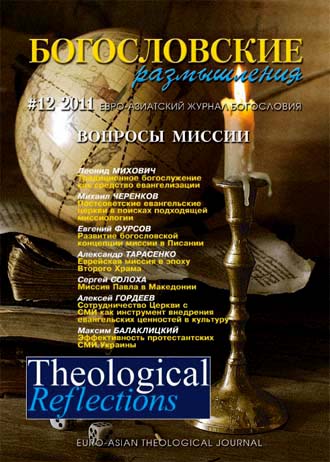The Mission of Paul in Macedonia: The Proclamation of the Gospel as an Anti$imperial Message
Keywords:
The Mission of Paul in Macedonia, The Proclamation of the Gospel as an Anti$imperial Message, Philippi and the Jews of ThessalonicaAbstract
"The Mission of St. Paul in Macedonia" examines the essence of the opposition faced by the Apostle Paul when he brought the good news to Europe. Paul was accused that his apostolic international mission was anti-traditional, anti-cultural, and illegal. His main accusers were businessmen in the city of Philippi and the Jews of Thessalonica, who used political power and mobs against the Gospel. The Apostle preached in towns with well-developed Emperor cults during the reign of Claudius, who had already expelled the Jews from Rome on the basis of religion. Although the Gospel had political implications in its key terms and conflicted with the royal theology of Caesar, this was not the main reason for persecution on the part of the authorities. Paul sees the main opponent of the Gospel as neither the Emperor who resides in Rome, nor the Jews, the religious zealots, but as Satan, who uses the authorities as instruments of opposition.References
- Periodicals:
- Burton Ernest DeWitt. “The Politarchs” in The American Journal of Theology 2.3 (1898): 598.
- Brent Allen. “Ignatius of Antioch and the Imperial Cult” in Vigiliae Christianae 52.1 (1998): 30-58.
- Donfried P. Karl. «The Cults of Thessalonica and the Thessalonians correspondence» in New Testament Studies 31 (1985): 336-56.
- Davies E. Paul. “The Macedonians Scene of Paul's Journeys” in the Biblical Archaeologist 26.3 (1963): 91-106.
- Edson Charles. «Macedonica» in Harvard Studies in Classical Philology 51 (n.d.): 125-136.
- Edson Charles. «Cults of Thessalonica [Macedonica III]» in The Harvard Theological Review 41.3 (1948): 153.
- Harrill J. Albert. «Paul and Empire: Religion and Power in Roman Imperial Society» in The Journal of Religion 79.4 (1999): 711.
- Hendrix L. Holland. “Thessalonians Honor Romans.” Th.D. thesis, Harvard Divinity School, 1984.
- Scott Kenneth. "The Divinity of the Roman Emperor» in The American Journal of Philology 53.1 (1932): 82-86.
- Schuler Carl. «The Macedonian Politarchs» in Classical Philology 55.2 (1960): 90-100.
- Tracey L. Howard. “The Literary Unity of 1 Thessalonians 4:13-5:11.” Grace Theological Journal 9.2, 1988. 163-90.
- Wright N.T. “Paul’s Gospel and Caesar’s Empire.” www.ntwrightpage.com/ Wright_Paul_Caesar_Empire.pdf. Cited 29.06.11.
- Books:
- Brent Allen. The Imperial Cult and the Development of Church Order: Concepts and Images of Authority in Paganism and early Christianity before the Age of Cyprian. New York. E.J. Brill, 1999.
- Donfried P. Karl and Johannes Beutler (eds.). The Thessalonians Debate: Methodological Discord or Methodological Synthesis? Michigan: Grand Rapids, 2000.
- Jeffers, The Greco-Roman World of the New Testament Era: Exploring the Background of Early Christianity. Downers Grove: IVP, 1999.
- Horsley A. Richard (ed.). Paul and the Roman Empirical Order. Harrisburg: Trinity Press International, 2004.
- Horsley A. Richard (ed.) Paul and Empire: Religion and Power in Roman Imperial Society. Harrisburg, Pennsylvania: Trinity Press International. 1997.
- Price S. R. F. Rituals and Power: The Roman Imperial cult in Asia Minor. Cambridge: Cambridge University Press. 1986.
- Wright, N. T. Jesus and the Victory of God. Minneapolis: Fortress Press, 1997.
- Кардини Франко. «История средневекового рыцарства.» www.countries.ru/library /middle_ages/kardini/part2-1.htm. Цитировано 10.07.2006.
- Макшин Н. А., История древнего мира. М.: ГИПЛ, 1947.
- Светоний Г.Т. (пер. М.Л. Гаспрова), Жизнь двенадцати цезарей, Киев: Украина, 1996.
Downloads
How to Cite
Issue
Section
License
Copyright (c) 2020 Sergey SOLOKHA

This work is licensed under a Creative Commons Attribution-NonCommercial 4.0 International License.
All articles published in the Journal are distributed under a Creative Commons Attribution-NonCommercial 4.0 International License
By submitting an article for publication in Theological Reflections: Eastern European Journal of Theology the author grants the editors the right to publish the article and distribute it in electronic and print form.
The author reserves all copyrights and the right to use the materials of the article in whole or in part for educational purposes, to write his own dissertations, to prepare abstracts, conference reports, oral presentations, etc., as well as post electronic copies of articles (including the final electronic version downloaded from the journal’s official website) on non-commercial web-resources without the consent of the editorial board and founders.



